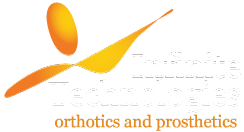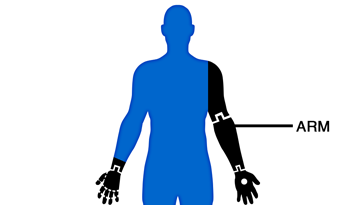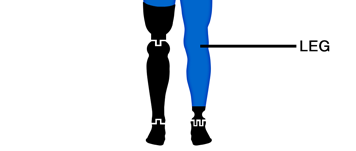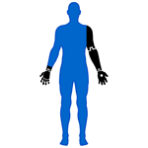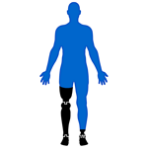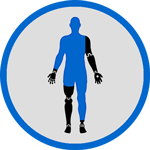
Prosthetics
Welcome to our prosthetics page! No matter where you are in your recovery process, a successful prosthetic outcome will depend on caring, qualified prosthetic practitioners, state-of-the-art technologies, and a multi-disciplinary approach. At Infinite Technologies O & P, our ABC certified practitioners are truly committed to high quality prosthetic services while working within your rehabilitation team.
We will meet with you and LISTEN to you regarding your medical hurdles, interests, and goals. This may take place in the hospital setting, a doctor’s office, at our offices, or at a skilled nursing/rehabilitation facility. Our emphasis is on being a resource to you at a critical time of need by providing inpatient and outpatient support.
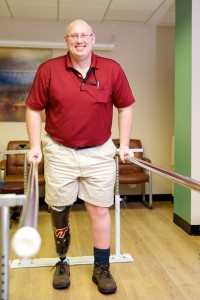
By combining the on-site fabrication lab with emerging technologies in the industry, our staff will engineer a highly specialized prosthesis tailored to your specific needs and goals. Our experience has given us a reputation for successfully fitting amputees who have previously been unable to achieve a proper fit. Although we are based in the Metro DC area, clients travel from around the US to visit us.
Whether you are in need of a prosthesis that will simply allow you to move around your home, or one that will make running a 26.2 mile marathon and climbing a mountain possible, we will find the perfect fit. This is achieved with unrivaled patient care for young children to seniors to world-class athletes by enabling them to reach their activity potential every day.
Technologies / Devices
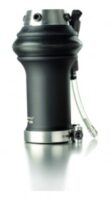
Harmony Suction System

HiFi Socket
The knowledge and experience necessary to address even the most challenging of cases, including bi-lateral, high-level and other “hard to fit” amputations.
Our prosthetists hold multiple certifications in the following microprocessor technologies: C-Leg, Genium knee, Orion Knee, Rheo Knee, Proprio foot, i-Limb, ProDigits, BeBionic Hand.
Available as a patient advocate from a pre-amputation consult through definitive prosthetic fitting to facilitate an interdisciplinary approach with your physician and therapist highlighting our commitment to giving you all the resources necessary to achieve your functional goals.
Innovative, custom designed prostheses combined with state of the art prosthetic technologies are fabricated on site, ensuring the highest control standards.
Our patient friendly atmosphere allows patients to meet and socialize with many new friendships being formed. When patients share their experiences it supports others with limb loss and provides a sense of community and belonging which is invaluable, no matter where you are in the recovery process.
Georgetown University Hospital
Meets: 2nd Tuesday of every month
Time: 5:30-7:30pm
Where: Hospital Administration Conference Room (First Floor)
3800 Reservoir Road, NW
Washington, DC 20007
National Rehabilitation Hospital
Meets: 2nd Saturday of every Month
Time: 4:00-5:00pm
Where: New Value Conference Room (Ground Floor)
102 Irving Street
Washington, DC
More Information: 202.877.1501
Ability with Mobility
Meets: Last Thursday of every Month
Time: 6:00-8:00pm
Where: Adventist Rehabilitation Hospital
9909 Medical Center Drive
Rockville, MD 20850
More Information: 240-864-6200
Winchester Amputee Support Group
Where: 333 W. Cork Street
Winchester, VA 22601
More Information: 540-536-5113
Kernan Hospital Group
Meets: 3rd Wednesday of every month
Time: 6:30-8:30pm
Where: Room G604
2200 Kernan Drive
Baltimore, MD
More Information: 410-448-6731
We Specialize In:
- Microprocessor technology
- Customized sports prosthesis
- Vacuum–assist above knee and below knee prosthesis
- Upper extremity myoelectric hybrid prosthetic systems
- Pediatric prosthetics
PROSTHETICS FAQs – Frequently Asked Questions
Below are the most common questions people ask us about prosthetics, but please feel free to contact us with any questions you may have. We look forward to talking with you!
Feeling your toes is referred to as a phantom sensation. A phantom sensation is a feeling that seems to originate from a part of the body that is missing. Phantom sensation/pain can present in other ways, such as pain in the knee or ankle, itchy skin, or cramping of muscles. The cause of this phenomenon is not clearly understood. Some believe that it originates from a psychological source, in that the body has not adjusted to the removal of a body part. Some believe that it originates from the nerves being severed at some mid-point. This is a very common experience after an amputation. There are several techniques people have found useful to treat the sensations or pain and usually the pain will lessen significantly after fit with your prosthesis.
Yes. An orthotic and/or prosthetic device is effecting your body in one way or another. Therefore, a physician’s approval/prescription will ensure proper treatment of your physical condition and is needed by law. An initial consultation does not require a prescription.
Generally insurance carriers do pay for most O & P services. Our administrative staff is highly knowledgeable in the ever-changing health insurance industry, and strive to get you the benefits you deserve whether you are in network or out of network with the insurances we are providers for. A general misconception is that you need to go to a facility that carries your particular insurance. Most of the time, our prosthetisst will have more options for you if we are NOT providers for your insurance. It usually allows us MORE freedom to choose high quality, advanced technology componentry for you rather than being constrained to only the components allowed by your insurance plan. Let our trained staff inform you of your options and the flexibility we offer our patients.
You do have a choice, although you may not realize it. Most amputees have little time to prepare for losing a limb and find themselves numb with grief and feelings of isolation. Prosthetics is a medical specialty few people are acquainted with, including many health care professionals. However, there are many differences among practitioners, and amputees and their families need to take the time to gather information and learn about the many options available.
We advise that you become an informed consumer. The Amputee Coalition of America recommends that patients contact several prosthetic facilities and consult with each before making a choice. Talking to other amputees as well can help to educate a new amputee as to what options are available. The National Limb Loss Information Center (1.888.AMP.KNOW) will send you resource materials to help you with this process.
Where can I find information regarding my insurance coverage?
There is a number on the back of your insurance card you can call to get information regarding your coverage. You can also call our billing specialist if you have any questions regarding your insurance.
Absolutely not! One of the most important things that you can have during this time is peace of mind. By coming in for a tour of the facility, introduction to our staff, and a view of different options for componentry and materials, you may reduce some anxieties or concerns you may have about the process after an amputation and during the fitting of your prosthesis. Our patients tell us that taking advantage of this opportunity made a positive difference in their pre-and post-operative mindset.
The person who ultimately makes that decision is your doctor. We are practitioners certified by the American Board for Certification in Orthotics and Prosthetics and require a prescription from a medical doctor in order to begin fabrication of a prosthesis. Evaluations and consultations are always done free of charge. Our staff will take every opportunity to consult with your physician regarding your amputation, any medical precautions, and issues that may affect your options or expected outcome.
Infinite Technologies has a full-scale fabrication lab on-site that enables us to complete work very efficiently. Depending on whether or not additional check sockets have to be made, the prosthesis can be fabricated for the next 1-3 days. Additional time is required to “try out” the prosthesis and make necessary adjustments. We strive to make our services fit the needs of the individual.
Yes! All practitioners at ITOP are in good standing with ABC. They are also given the resources needed to attain and maintain continuing education requirements. We consistently attend national meetings and/or seminars that concentrate on potential advances in the field of prosthetics that could prove beneficial to our clients.
Socks are needed when your limb changes volume. Here are some signs that indicated socks are needed:
- Socket feels loose
- Pain on bottom of limb
- Socket spins when walking
Gel liners need to be cleaned after each use. Warm water with a mild soap is recommended. Allow the liner to air dry. Putting the liner in the dryer will damage it. It is also recommended that once a week you wipe down the inside of the liner with rubbing alcohol. Sticking to a daily cleaning routine will cut down the amount of odor from your liner.
Most prostheses, uncovered, should not be worn in the shower. The water will rust the metal components and screws. The links below are for prosthetic shower covers:
Allegro Medical: www.allegromedical.com 800-861-3211
or
MedGuard: www.medguard.net 800-713-1133
A prosthesis can last for several years. The length of time depends on the amount of time the patient wears the prosthesis and what type of activities it is used for. Prostheses are designed to be very strong and durable. However, it is a good idea to have your prosthesis checked out every 8- 12 months to make sure it is in good working order. Liners will usually start to wear out in about 6 months. But they can last up to 12 months or longer. Just like the prosthesis, the longevity of the liner depends on amount of usage.
If you are ever in need of new liners, socks or some other supply, please call the office at 703-807-5899 or contact your prosthetist to order more supplies.
It is not recommended that you wear your prosthesis to bed. Wearing the prosthesis for an excessive amount of time will most likely cause harm to your limb.
Remain calm and contact the office or your prosthetist immediately.
Discontinue use of your prosthesis immediately or limit the amount of time you wear it drastically. Contact the office or your prosthetist as soon as possible.
The manufacturing and fitting of your prosthesis will take a 1-3 weeks. It takes an average of 3 or 4 visits with your Prosthetist to get the right fit. We understand that you are anxious to return to activities of daily living on your new prosthesis, so we do our best to deliver your prosthesis in a timely fashion.
Before you are fit with a prosthesis, you should try to wear the shrinker as much as possible during the day and night. Take the shrinker off to bathe. You should have two shrinkers to alternate while you’re washing one. Shrinkers can be hand washed or put in the laundry with your other clothes. Once you receive your prosthesis and start wearing it on a regular basis, you don’t have to wear the shrinker as much. It is still a good idea to wear the shrinker to bed to control any swelling over night, so that you can fit in to your prosthesis in the morning.
The fitting process can begin after your stitches or staples have been removed and you are fully healed. It is also recommended that some of the swelling has decreased before you are cast for your first socket.
You must have a prescription from a physician in order to get a prosthesis. Most physicians need to have seen you in the past 6 months before they will write a prescription. We are able to work with you and your physician to request a prescription if you have seen them recently.
The majority of people with amputations are able to return to the activities they were doing before the amputation. During your initial evaluation, your prosthetist will ask for your personal goals so they can make a prosthesis to help you achieve them.
Once you are fit with your first socket, we strongly recommend you getting gait training from a physical therapist. This can be done at an inpatient or outpatient facility. Your therapist will work with you on how to use your prosthesis as well as learn to walk with it.
The weight of your prosthetic leg will depend on the type of prosthesis it is and its components. An average below knee prosthesis will weigh around 4 pounds and an average above knee prosthesis will weigh around 8-10 pounds. Your prosthetic leg often weigh less than what your anatomical leg did.
